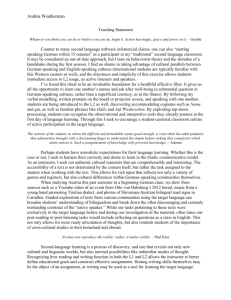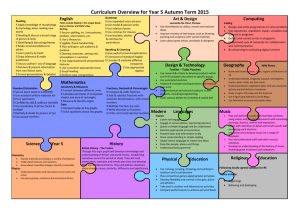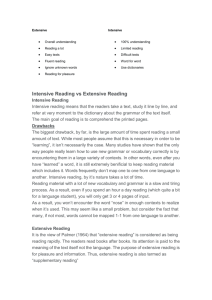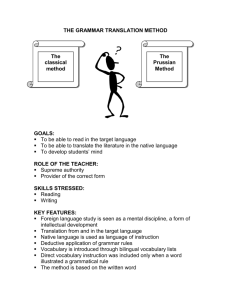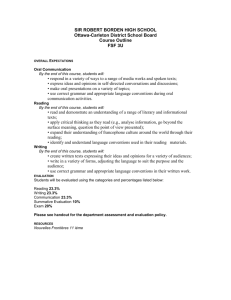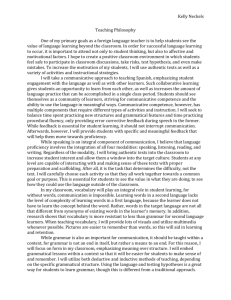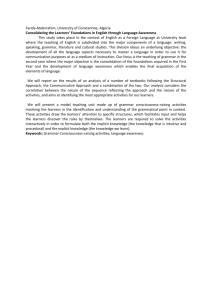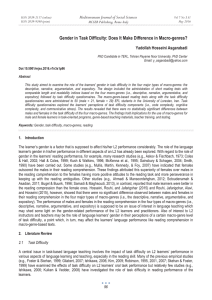Reading
advertisement
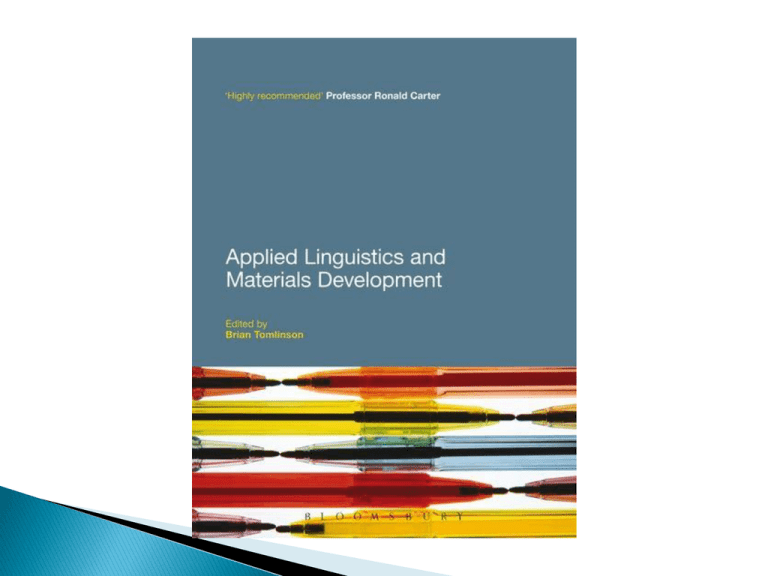
Chapter11 of applied linguistics and material development Presenting by: Mohsen Saberi, Nastaran Rashidi Reading involves the most incredibly complex, interrelated set of brain processes human ever have to engage in. Reading is: relating what we read to what we have already read earlier in the text, and to our previous world knowledge, visualizing and engaging in inner dialogue with ourselves From the L2 perspective, reading has been viewed in different ways at different times.in the audio-lingual and structural-situational paradigms, it was largely seen as a vehicle for teaching aspects of grammar, vocabulary and pronunciation-text as pre-text and after that reading came to be regarded as a psycholinguistic guessing game Reading ability relates also to what kind of text we read, and the manner and purposes for which we read them. Broadly speaking, we can divide texts into expository(non-literary) and imaginative(literary) Expository texts tend to deal with factual objects, ideas and opinions which are in real world, these texts are predictable and unambiguous Imaginative: require us to make an effort to represent the imaginative world we enter as we read the text. This requires imagination Intensive reading: takes place when the teacher takes the learners through a text by explaining vocabulary, grammar and constructions. Extensive reading: its reading for pleasure, there is no task here In the L1, what is crucial is that children are introduced early to books by adults. Those children become readers whose parents read aloud to them at bedtime, and who make sure that there are plenty of books in the home environment. In L2 , the place of loving parent should ideally be taken by teachers who make sure that the condition for reading are in place There is a good deal of evidence to show that the benefits for L2 learners are much the same as those for L1 learners. In the L1 these include affective, cognitive and linguistic benefits. 1. affective benefits: includes self-esteem and confidence, leading to motivation to go o reading more , as well as the pleasure of getting lost in a book 2.cognitive benefits: includes knowing more about the world. When we read widely, we necessarily come across more information which we integrated with what we know already. Those who read more, tend to know more and to remember it for longer. Opinion Is divided in this issue. There are those who believe that reader need to be familiar with 95 percent of the words and if there are lots of unknown words it will be tedious for learners.so they believe that texts should be a level lower that the person knowledge(i-1) Others believe that text should have something know for the learners Walter and Swan (2009) argue that it is not reading strategies that students need: they already know how to read. What they need is more work on the language itself to bring them to a stage where they have near automaticity But others believe that learners who know the strategies will be at higher level of language proficiency, when students no longer processing the text at word and sentence level Many books are accompanied by lots of questions. It is because they will help the teacher to make sure whether students understood the text or no But every 5 minutes spent on activities is 5 minutes lost for reading time There is no evidence to suggest that activities make any difference to the quality of the reading experience Instead teachers can device some kind of activates like giving short book talks and asking open ended questions A major argument against testing is that tests inevitably require students to read intensively, as if they were reading for facts rather than for overall understanding and enjoyment Tests only test what can and the essence of reading cannot be reached by test The best we can do is to check, whether they enjoyed the reading or no English in mind (Puchta &stranks,2010)is not untypical of elementary(CEF A2/B1)level courses where differing approaches are adopted for language focused and skill focused lessons. In student’s book2 unit 11 (pp. 82_7) the language aims of which are given as “Defining relative clauses ,used to , vocabulary : medicine .we find a reading text on ‘medicine in the past ‘ .It contains a number of examples of the target structures ,followed by true/false/no information comprehension questions and then a personalization activity where students imagine what it was like to be ill 2000 years a go .two pages of grammar and vocabulary exercises follow. At the end of the unit there is a ‘culture in the mind ‘ double page Spread where a reading text in the same topic area is exploited intensively with comprehension questions and vocabulary work ,but not for grammar teaching purposes .and followed by another reading text which acts as a model for a writing exercise. Global (clanfield et al., 2011)upper intermediate has 12 page units which contain a number of reading texts used for different purposes. Unit 6 “power & money” (pp.66-7)has three grammar foci: the passive voice ,causative have/get and quite . The first substantial text is a specially written one , “the masters of the universe ?” which is exploited to teach adverb phrases such as “obviously “ , but the phrases themselves are not ‘seeded’ into the text. After true/false comprehension questions and vocabulary work there are questions asking for a personal response to the text ,for example, ‘do bankers hold too much power in today’s society ?’ . In contrast , the next text ‘ten facts about lotteries’ does have examples of the target structure Quite seeded in and students are explicitly directed to find them before doing grammar exercises . The third main reading text ‘Economics for everyone ‘ is an extract from a book and the exploitation focuses on the content , on how the author develops his argument and how he expresses himself . In other words the focus is on rhetoric not surface language . The final reading text serves as a model for a writing skills section dealing with report writing . In part one we noted that a top-down approach to reading had led to an emphasis on the reading strategies deployed by proficient readers and that more recently , lower-level skills … have been to some extent reinstated in interactive approaches . Reading Explorer (douglas et al., 2012) aims to develop both reading and vocabulary through the use of texts from national geographic magazine . Unit 8 of book 5 (CEF C1-C2 ) (pp.137-54) opens with pre-reading discussion , skimming and prediction tasks before a three-page , 150 line (approximately 1,500 word ) text on ant and bee behavior and its relevance to humans . It is followed by a page of multiple-choice questions which focus on the rhetorical structure of the text and a page with two major exercises , one on classification involving assigning statements to spaces in a venn diagram and one stimulating Critical thinking .this structure of exploitation and text is typical of the other text in this unit and other texts in the book . The coursebooks for teenagers and for adults surveyed above were concerned with intensive reading . In the context of extensive reading in part one it was noted that ‘there is little or no evidence to suggest that activities and questions make any difference to the quality of the reading experience or to the learning that derives from it. According to all of the benefits that the extensive reading has great publishers like Cambridge discovery readers, penguin , …. Recently published books that contain activities for their text readings . The teacher can , of course , recommend that students only read the text and ignore the accompanying activities. As for course books , our samples above for both teenagers and adults showed a very conservative treatment of reading , largely as a vehicle for language work . One reason for this is the space constraints within which a course book writer works , weaving the threads of a multi-syllabus , promoting study skills and learner independence , as well as developing the four skills . A suggestion would be to accept that reading in language-focused lessons (whether the aims are expressed in functional or grammatical terms) will be largely a vehicle , and deal with reading per se elsewhere. Elsewhere , but not separately . An integrated skills approach offers the opportunity for real reading skills development and genuine response to content . By integrated skills is meant a lesson where the four skills support Each other : speaking leads into reading . Which fosters discussion , supported by listening leading to a written product . Such an approach does not mean the elimination of language work (this is about language learning) but it is focused on understanding the text and the words which structure it . Comprehension questions also have a place , but they must take the learner away from detail , and concentrate on meaning and a response to it . Dependent on level , the text can be unsimplified , adapted or specially written , but the key thing is that it be written to be read for itself , not used to exemplify a language point .
